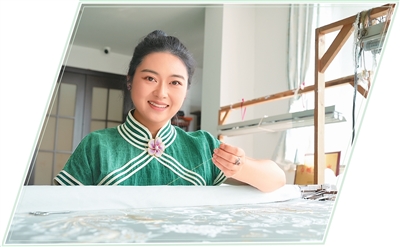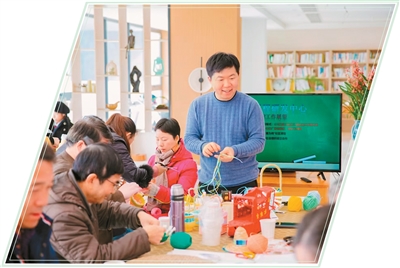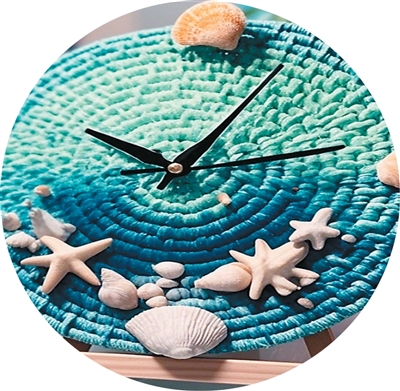




- BRNN
- BRI News
- BRNN News
- Database
Official Documents Polices and Regulations
Inter-government Documents International Cooperation BRI Countries
Business Guide Economic Data BRI Data
Trade
Investment Projects Latest projects
Cases - Content Pool
An increasing number of Chinese intangible cultural heritage inheritors with international education backgrounds are breaking barriers and reaching wider audiences.
Fu Hanlu, a fourth-generation Suzhou embroidery inheritor from a family in Suzhou, east China's Jiangsu Province, is one of them. She went to the University of Leicester to pursue a master's degree in media and advertising in 2015 and now serves as a council member of the Suzhou Western Returned Scholars Association.

Fu Hanlu, a council member of the Suzhou Western Returned Scholars Association, works on a Suzhou embroidery piece. (Photo courtesy of the interviewee)
"I wanted to help more foreigners understand Chinese culture. That desire became my motivation to contribute to the country after returning from abroad," Fu said.
After returning to China, Fu began teaching at a Chinese-foreign cooperative university. By chance, she taught an English-language course on Suzhou embroidery culture to international students, blending the traditional craft with Suzhou's rich history. The course received an enthusiastic response, inspiring her to establish an organization dedicated to promoting Suzhou embroidery and developing a comprehensive bilingual curriculum for students.
In 2016, Fu founded her own Suzhou embroidery brand. Through her efforts and the skill of local embroiderers, the brand's creations have been showcased at international fashion events, including Paris Fashion Week and Beijing International Fashion Week, bringing Suzhou embroidery culture to global audiences.
Fu also launched a professional cooperative for folk crafts in Suzhou's Wuzhong district, transforming embroiderers from production-line workers into shareholders. The initiative created a new Suzhou embroidery model that integrates cultural creativity, rural innovation and intelligent production, helping improve the livelihoods of local embroiderers.

Photo shows Suzhou embroidery products designed by Fu Hanlu, a council member of the Suzhou Western Returned Scholars Association. (Photo courtesy of the interviewee)
Building on Suzhou's dual strengths in embroidery and horticulture, Fu further established the city's first shared farm themed around Suzhou embroidery. In 2023, she was recognized as a national young pioneer for rural revitalization.
More recently, Fu has designed innovative wearable Suzhou embroidery products that combine traditional craftsmanship with modern jewelry, such as necklaces and brooches, giving the ancient art a fresh, contemporary appeal.
Fu has been an active promoter of Suzhou embroidery on the international stage. She has participated in the China-France Cultural Forum three times and exhibited Suzhou embroidery works in Lyon, Nice and other French cities. In 2019, she curated a Suzhou crafts exhibition featuring 10 intangible cultural heritage items, including Suzhou embroidery. The exhibition, held in both Suzhou and Nice, received widespread acclaim.
Chen Zhen, vice president of the Wenling Western Returned Scholars Association and general manager of Copisoya Weaving (Zhejiang) Co., Ltd., is another young inheritor combining traditional craftsmanship with a global outlook.
Based in Wenling, a county-level city under Taizhou in east China's Zhejiang Province, Chen is a county-level representative inheritor of Wenling straw-weaving techniques. His parents established a straw-weaving workshop in 1986.

Chen Zhen, vice president of the Wenling Western Returned Scholars Association, teaches straw weaving at a workshop. (Photo courtesy of the interviewee)
In 2017, Chen traveled to the United Kingdom to study international business, taking elective courses in fiber arts to further explore his passion for straw weaving.
On a whim, he rented a small shop to sell traditional Chinese handwoven straw hats, but sales were disappointing. Later, he began displaying semi-finished products and invited customers to try weaving themselves. To his surprise, many enjoyed the experience and even left generous tips. The interactive sessions soon generated far more income than hat sales.
The experience gave Chen valuable insight into Europe's strong demand for eco-friendly handicrafts. He realized that the nearly forgotten straw-weaving techniques from his hometown carried immense cultural and commercial potential.
The cultural exchange he encountered in the UK became a turning point, inspiring him to continue his family's legacy.
After returning home in 2018, Chen launched his own business with support from local governments. In 2020, he partnered with Taizhou University to establish a straw weaving curriculum research center dedicated to documenting and reviving traditional techniques. Drawing on unearthed artifacts, historical records and oral traditions, the center has restored a wide variety of ancient straw-weaving methods.
To make the craft more accessible, Chen simplified complex techniques into short, interactive formats that participants could easily master, turning straw weaving into an immersive cultural experience. His courses were recognized as outstanding examples under Zhejiang Province's initiative to bring intangible cultural heritage into campuses.

Photo shows a straw weaving product created by Chen Zhen, vice president of the Wenling Western Returned Scholars Association. (Photo courtesy of the interviewee)
Today, Chen's straw-weaving programs have reached schools in seven countries, engaging 45,000 students. In July 2024, the Chinese Service Center for Scholarly Exchange (CSCSE), an institution under the Ministry of Education, highlighted his project on its official WeChat channel as a model of entrepreneurship among returnees with international education backgrounds.
Chen has established straw-weaving workshops in Pengjie town in Taizhou's Luqiao district and other areas, employing professional instructors to teach the craft. Participants are paid on a piece-rate basis for completed work, a flexible income model welcomed by local villagers.
The workshops source raw materials directly from local farmers. Each year, Chen's company purchases more than 10 million yuan (about $1.4 million) worth of semi-finished straw-weaving products and raw materials such as corn husks and wheat stalks from rural households.
Looking ahead, Chen plans to further promote Chinese culture overseas by organizing straw-weaving experience sessions in France, Spain, Portugal and other countries.

Tel:86-10-65363107, 86-10-65368220, 86-10-65363106